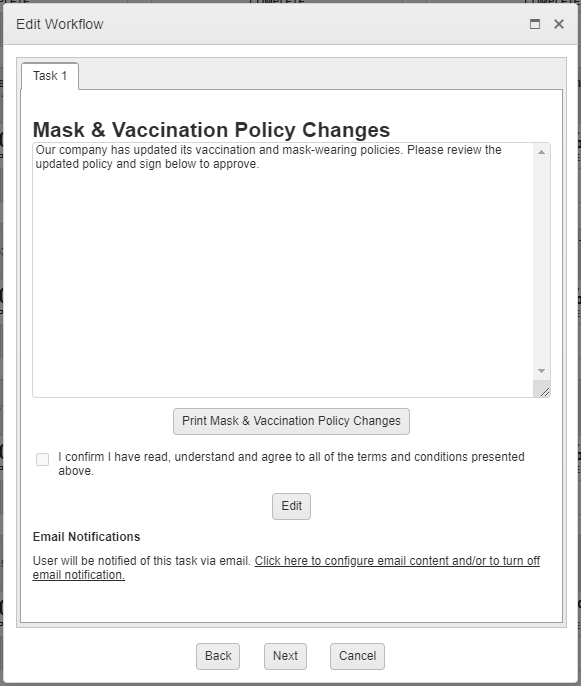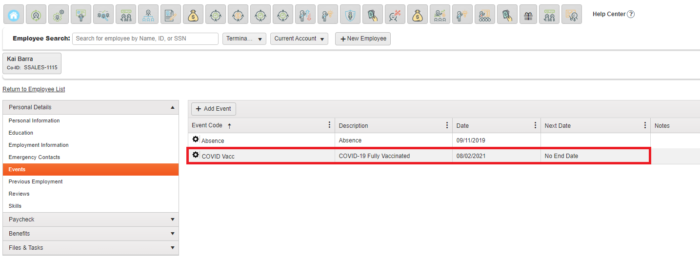
Vaccines, masks, and mandates–oh my! With daily updates coming out about the increased dangers of the COVID-19 Delta Variant, the CDC and workplaces across the country are again reviewing their policies to keep workers safe. In this article, our HR Team has gathered some of the top employer questions we’ve been hearing about COVID Vaccinations.
1. Can we ask for proof of vaccination? Isn’t this a HIPAA violation or an illegal inquiry under the ADA or somehow confidential information?
Employers can ask for proof of vaccination unless there is a state or local law or order to the contrary.
When an employer requests or reviews medical information in its capacity as an employer (i.e. asking an employee’s vaccination status), it is considered to be an employment record. In such cases, HIPAA would not apply to the employer. The ADA will govern the collection and storage of this information.
The Equal Employment Opportunity Commission (the EEOC), which enforces the ADA, has said that asking about vaccination is not a disability-related inquiry. However, be aware that it could turn into one if you ask follow-up questions about why the employee is not vaccinated.
Asking a yes or no question, or requesting to see the employee’s vaccination card, does not violate any federal laws or require proof that the inquiry is job-related.
Finally, just because employees think that something is or should be private or confidential doesn’t necessarily make it so. Social Security Numbers, birth dates, and home addresses are all pieces of information an employee may not want to advertise, but sharing this information with their employer is necessary and required.
Vaccination status is similar. Just keep in mind, employers should avoid sharing this information with third parties except on a need-to-know basis.
Note: State & Local Executive Orders
It appears that some Governors may attempt to prevent certain entities from requiring “immunity passports” (e.g., proof of vaccination) through Executive Order. (Although as of May 27 none of the EOs already issued appear to apply to private businesses and their employees.)
Additionally, note that some states (like Montana) may have laws in place preventing treating vaccinated and unvaccinated employees differently. In these cases, you may be able to ask, but not take any action based on the response.
2. Should we keep a record of employee vaccination statuses or make copies of vaccination cards? If we do, how long do we have to keep it for?
If you’re asking about vaccination status, you’ll want to keep some kind of record (so you don’t have to ask multiple times). But how you do so is up to you, unless state or local law has imposed recordkeeping requirements.
For example, you may want to keep an excel spreadsheet with the employee’s name and a simple “yes” or “no” in the vaccination column.
If you’d prefer to take a copy of their vaccination card, you should keep this with other employee medical information, separate from their personnel file.
If state or local law requires recordkeeping, then follow those requirements, including how long to keep the records for. However, if no law is in play, we recommend keeping the information for as long as you keep other information in employee medical files.
3. If we keep a record of vaccinated employees, can we share it with managers to enforce our policies based on that information (i.e. masking and social distancing)?
Yes, though we recommend not sharing this information any more widely than necessary. While you may share anonymized information (e.g., “80% of our employees are vaccinated!”), you should treat each employee’s vaccination status as confidential.
This applies even if the fact that they are wearing a mask to work seems to reveal their status publicly.
Obviously, managers will need this information in order to enforce vaccination-dependent policies. Employers should train them on how they should be enforcing the policies and how and when to escalate issues.
4. If an employee has had COVID, is that as good as being vaccinated?
No. The CDC differentiates between those who are fully vaccinated and everyone else.
Having had COVID does not appear to provide the same level or length of immunity as the vaccine. As a result, it is not a suitable substitute when determining which safety measures should be enforced.
5. Can we forbid employees from wearing masks, assuming no laws say otherwise?
Theoretically, yes. However, employers must provide reasonable accommodation to unvaccinated employees due to disability, pregnancy, or religion.
Employers should also provide reasonable accommodation to vaccinated employees who will not get the same level of immunity from the shot as the general population.
Additionally, keep in mind that there may be repercussions as this is in direct opposition to current federal guidance. As a result, this type of policy would likely result in OSHA complaints, bad publicity, and/or lawsuits.
Even if state or federal laws do not explicitly allow masks, we recommend allowing employees to wear them for any reason or no reason at all.
COVID Vaccinations and SDP Connect
If you are currently processing payroll in SDP Connect, then there are several features in your portal to help with Vaccination policies and procedures.
Acknowledging Your Vaccination Policy
If you need to make changes to your company’s current Masking Policy or Employee Vaccination Documentation Policy, Review & Approve Workflows are a great way to administer your updated policy and document employee approval. Learn how to set yours up here.

Recording Vaccinations
If you decide to keep a record of employee vaccinations, you can do this by creating an Event code for Employee Vaccinations. This can be done from the HRIS Administration module under Payroll And Setup > Miscellaneous Configuration > Event Codes > Add Event Code.

That way, you can record employee vaccination statuses directly from their employee profile in your HRIS portal. Additionally, you can create workflows tasking employees who you do not have a vaccination status to submit their Vaccination status to you (using an Employee Event trigger type!).
Vaccination Card Copies
Finally, you can use your SDP Connect portal as a digital filing cabinet to house your employee vaccination card copies. (If you choose to keep them.)
Simply upload your scanned file to the Employee’s My Files tab, and click save to add the documentation to the employee’s record in our secure, digital filing cabinet.
Let’s Talk
With frequently changing employer and CDC guidance, creating effective and updated masking and vaccination policies can be tricky! No matter your situation, our HR team is here to help. If you need any help navigating COVID-19 for your business, let us know here.
Finally, don’t forget to follow us on Facebook, Twitter, and LinkedIn for even more business tips & news!
Photo by August de Richelieu from Pexels
*Southland Data Processing, Inc. (“SDP”) is not a law firm. This article is intended for informational purposes only. It should not be relied upon in reaching a conclusion in a particular area of law. Applicability of the legal principles discussed may differ substantially in individual situations. Receipt of this or any other SDP materials does not create an attorney-client relationship. SDP is not responsible for any inadvertent errors that may occur in the publishing process.
